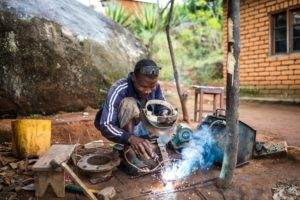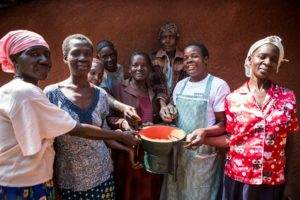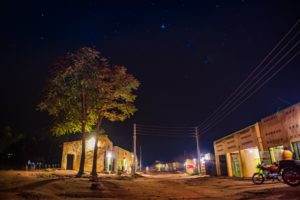Even before the Covid-19 pandemic, progress towards the United Nations goal of universal energy access by 2030 was far too slow, especially amongst the poorest in remote rural areas.
Our last article highlighted how a lack of access to modern energy services compromises people’s health and limits economic and educational opportunities. When we come out of this crisis, energy access provides an opportunity to help communities towards recovery.
In this article, we explore how clean and affordable energy access is a win-win solution – with benefits including jobs, improved health and livelihoods, as well as carbon reductions.
Making it green and safe
Energy from natural and renewable sources – from the sun, wind, water and biological processes – is a climate-friendly way to supply electricity, especially where the grid does not reach.
Tapping into the renewable energy revolution
Globally, renewables now supply around 25% of electricity and growth has continued (albeit at a slower pace than before) during the pandemic.
The growth of solar power has been particularly impressive, with global solar capacity increasing from 40 GW to 580 GW between 2010 and 2019 according to the International Renewable Energy Agency.

In Malawi, off-grid electricity is powering businesses like Emmanuel’s, which couldn’t operate without power.
At the same time, prices of solar modules have dropped by 90%.
The cost reductions of solar, together with similar price drops in batteries and LED lights, have revolutionised electricity access in off-grid communities.
A key benefit of solar power is that it can be deployed at a variety of scales, from basic solar lights to powering whole communities and businesses through solar-powered mini-grids. The off-grid solar market had seen record growth before Covid-19 hit and GOGLA estimates that over 100 million people are currently benefiting from improved energy access because of off-grid solar.
We’ve known about the transformative power of renewables for a long time. Our founder, Fritz Schumacher was a big advocate of renewable energy and we helped develop community micro-hydro plants in Nepal as far back as the 1980s. In 2018, we were presented with an award by the Nepali Minister for Energy in recognition of this work.
“As the world’s resources of non-renewable fuels—coal, oil, and natural gas—are exceedingly unevenly distributed over the globe and undoubtedly limited in quantity, it is clear that their exploitation at an ever-increasing rate is an act of violence against nature.”
E.F. Schumacher, Small is Beautiful
Clean cooking improves women’s lives

Women energy entrepreneurs with the improved cookstoves that are improving health and livelihoods.
Around 3 billion people currently cook on open fires or very basic stoves, using firewood or charcoal. In principle, wood is a renewable resource, but in many places, unsustainable firewood collection and charcoal production have led to deforestation. This causes local environmental problems, affects the water table and contributes to climate change. The use of inefficient fires and stoves also has huge health implications, especially for women.
In Kenya, we are working with women energy entrepreneurs to grow a clean energy industry selling improved cookstoves, as well as briquettes made from compacted waste like sawdust and coconut husks. The cookstoves use less fuel and, together with the briquettes, mean women no longer need to spend hours searching for wood or cutting down trees.
Cooking with electricity from renewable sources is becoming an option in some countries but still faces many obstacles. Our Nepal office has recently won funding for 2 projects under the Modern Energy Cooking Services (MECS) Electric Cooking Outreach fund competition to carry out a market assessment and to better understand the factors affecting the adoption of electric cooking options.
Making it life-changing
We’ve long argued that energy access needs to go beyond supplying basic household services such as lighting. In our Poor People’s Energy Outlook, we coined the term total energy access which refers to the full range of energy services for households, businesses and community services that enable the energy-poor to transform their lives.
We put great emphasis on the actual energy needs of people and work with them to find solutions.
Productive uses of energy in agriculture
In sub-Saharan Africa, most communities rely on subsistence farming for their livelihoods. With climate change affecting rainfall patterns in many areas, harvests have become increasingly unreliable but without access to energy, water pumping for irrigation is not possible. Furthermore, post-harvest losses are large as there are few options for food processing or cold storage. As we discussed in a recent paper for UNIDO, sustainable energy has the potential of transforming food systems and creating jobs, by improving production, storage and processing.
As an example of how this works on the ground, Practical Action has been involved in solar irrigation in Gwanda district in Southern Zimbabwe, where food security is a problem due to erratic rainfalls. In the past, there had been access to irrigation in some of the area through diesel pumps but the schemes have fallen into disrepair and diesel has become increasingly scarce and expensive.
In Mashaba, we’ve supported 100 farmers to get renewed access to irrigation through Zimbabwe’s first solar powered mini-grid. In addition to three irrigation schemes, the 99 kW plant powers teacher’s and nurse’s homes, a school, a health clinic and local businesses.
We’ve engaged with stakeholders in Senegal to demonstrate new models for integrating sustainable energy in agricultural value chains. The work identified excellent potential for sustainable energy (renewables and energy efficiency) to improve the value chain for horticultural products. For example, through solar-powered machinery for processing vegetables, fruits and spices.
“Before the solar grid we had to buy expensive fuel for a diesel pump to water our crops. But when the pump broke we couldn’t repair it, so we couldn’t water the crops, leaving us without food or an income.”
Mpokiseng Moyo – Farmer, Mashaba
Energy for community services help improve refugees’ lives

In Rwanda’s refugee camps, street lights are boosting the businesses and safety of refugees.
Many of the world’s 70+ million forcibly displaced people end up in refugee camps, which have little energy infrastructure.
We work in three refugee camps in Rwanda. More than half of the households had little or no access to any form of lighting, and the camps were unlit at night, restricting movement and access to facilities during hours of darkness. We’ve installed 185 solar-powered street lights, working with the community to identify the locations for the lights and ensuring their long-term upkeep.
The installation of the community lighting in October 2019 has allowed the three camps to become alive after nightfall and has improved quality of life for the people who live there. Children play and study together under the lights, there are street sellers selling fruit and vegetables and women feel safe to use bathrooms and toilets.
In addition to the street lights, we’re helping refugees in the camps access renewable energy to power homes, schools, health clinics and businesses, enabling them to flourish and move from reliance on aid to economic independence.
Making access possible for all
There has been good progress with energy access in some areas (e.g. electricity access in India). However, most people in remote areas or in other difficult settings (‘the last mile’) continue to be left behind.
One problem is that in many countries there has been a reliance on the private sector for providing off-grid energy access (e.g. through solar home systems), but it is difficult to find a working business model for the poorest communities.
We’ve been working to support companies and entrepreneurs who operate in last mile communities, as well as raising the profile of the energy-poor amongst decision-makers.
Strengthening last mile distributors
The Global Distributors Collective (GDC), hosted by Practical Action alongside implementing partners Hystra and Bopinc, is a collective of 200 last mile distribution organisations in more than 50 countries around the world. The GDC supports these organisations to reach millions of unserved customers with life-changing products, including off-grid solar products, clean cookstoves and fuels, water filters and more.
With their strong links to often marginalised and remote customers, such companies play a critical role in ensuring no one is left behind in our search for universal energy access. Yet, the sector has traditionally been fragmented, with companies working in isolation, constantly reinventing the wheel and not sharing knowledge or leveraging economies of scale.
To address this, the GDC adopts a systems approach, implementing ‘collective’ interventions that support the development of last mile distribution companies and the growth of the sector as a whole; while also producing fresh, new research and insights to support the wider ecosystem to better understand and support last mile distribution organisations (and, by extension, the customers they serve).
“Last mile distributors are on the frontline of the fight to ensure no-one gets left behind. Yet, the lack of understanding about the last mile distribution sector has translated into a lack of support for distribution companies – both financial and non-financial. The GDC wants to change that by putting a spotlight on the sector, to make sure that these companies get the support that they need.”
Charlotte Taylor, Communications and Project Manager, Global Distributors Collective, Practical Action
Funding energy access in a post-pandemic world
Even before Covid-19 hit, funding for energy access was inadequate. It has been estimated that USD45 billion per year of public and private investment is needed to achieve the 2030 UN goal of energy access for all. However, currently only USD36 billion flows into the sector, with off-grid electricity and clean cooking being particularly under-funded.
A certain level of public funding needs to be provided for increasing access at the ‘last mile’, as affordability is a key challenge for communities who generally have very low income levels.
Obviously, Covid-19 has had a huge impact on public finances, both for donor and recipient governments. In the short term, there rightly has been much focus on immediate relief to ensure the off-grid energy sector can survive. However, we also need to ensure that energy access funding is built into the longer–term recovery packages.
It is encouraging to see that the recent G20 summit agreed a clean cooking and energy access initiative aimed at addressing financing gaps, although it remain to be seen what concrete steps will be taken.
New opportunities for scaling-up energy access
Clean, green and affordable energy access provides valuable opportunities for building back better after the pandemic.
To speed up progress on providing energy access for all, we need concerted action and bold collaborations from international donors and financial institutions, national government, private companies and investors, as well as civil society organisations.
Together, we can create change that’s anything but normal.
Where affordable energy reaches everyone, everywhere
Where families can cook without risking their health
Where reliable energy fuels education, income and opportunities
Where clean energy empowers people and protects the planet
Where the world works better for everyone